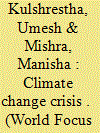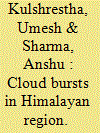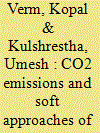|
|
|
Sort Order |
|
|
|
Items / Page
|
|
|
|
|
|
|
| Srl | Item |
| 1 |
ID:
148000


|
|
|
|
|
| Summary/Abstract |
It is high time to put our sincere efforts to implement a holistic program to develop new materials for cleaner energy for its cost effectiveness to make affordable to poor people in rural India. There is an immediate need to shift towards solar and wind energy options. As our country is known for agriculture, production of biomass and agricultural waste is unavoidable for which biorefinery is the need of the hour. These options of energy not only help developing rural India but will give rise to healthier and happier lives in the villages which will further help in increased GDP of the country.
|
|
|
|
|
|
|
|
|
|
|
|
|
|
|
|
| 2 |
ID:
145378


|
|
|
|
|
| Summary/Abstract |
The Himalayan range is the youngest with highly active mountains on the earth. These mountains have assumed a greater importance by regulating the weather of northern Indian subcontinent since times immemorial (Kumar et al., 2010). However, the inherent geological and anthropogenic influences has increased its susceptibility of these ranges to the hazards of landslides, failure of natural dams, glacial lakes outburst, flash flood, debris flows and cloud bursts (Kumar et al., 2010).
|
|
|
|
|
|
|
|
|
|
|
|
|
|
|
|
| 3 |
ID:
141238


|
|
|
|
|
| Summary/Abstract |
During the last five years, India has achieved to become world’s ninth largest economy with a real GDP growth of 8.7% which is exceptional evidence of the growth of Indian economy [Energy Statistics, 2013]. Such a high economic growth involves enormous pressure on the energy resources of the country resulting in increased demand and supply imbalance across all energy sources. India’s energy basket has mixture of all the resources with the dominance of coal [Energy Statistics, 2013]. Being the capital of India, Delhi is the hub of opportunities for all including youth, entrepreneurs, governments, and the directly or indirectly associated people. This catalyses the processes of migration which is responsible for the growth of population, size of the urban area and industrialization [Aggarwal and Jain, 2014]. This further leads towards increased energy consumption posing serious environmental and human health threats. The worsening air quality of the city is triggering various respiratory problems such as chronic bronchitis, lung cancer and infections etc. Adverse air quality also affects visibility and climate, most of the time making irreversible changes. One such example is climate change which is difficult to cope by `hard’ mitigating methods due to human desires and geographical competitiveness for modern development. Due to these reasons many people believe that our climatic conditions will never be restored into the original form and adaptation is the only option for future generation. However, it is possible to reduce greenhouse gases (GHG) and carbon emissions by `soft’ techniques. Taking into account the consumption of fossil fuels by different sources and their emissions in Delhi National Capital Region (NCR), this article focuses upon the soft approaches to mitigate (GHG) and carbon emissions.
|
|
|
|
|
|
|
|
|
|
|
|
|
|
|
|
| 4 |
ID:
154120


|
|
|
|
|
| Summary/Abstract |
Recalling the words of Mahatma Gandhi-”The world has enough for everyone’s need, but not enough for everyone’s greed”, this article emphasizes upon the public participation and mass awareness in resource utilization and management. By involving the common man in management, ‘everyone’s need will not be overlooked. At the same time, it will help in checking overexploitation of resources by greedy business groups.
|
|
|
|
|
|
|
|
|
|
|
|
|
|
|
|
|
|
|
|
|